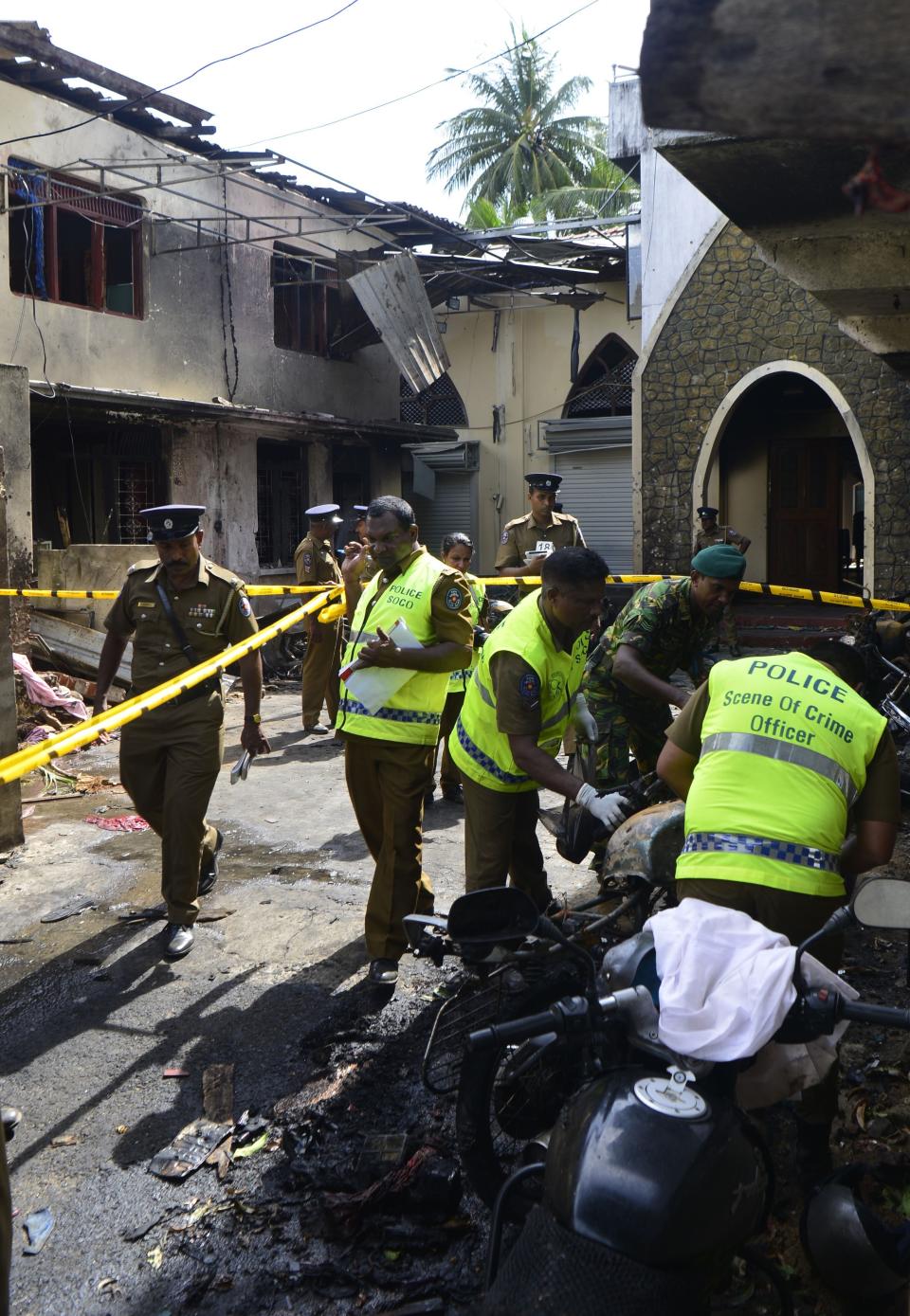Sri Lanka says militant group National Thowfeek Jamaath is suspected in Easter Sunday bombings
A string of bombings at churches, luxury hotels and other sites on Easter Sunday killed at least 290 people, including "several" Americans, in an attack on the South Asian island of Sri Lanka.
A police spokesman said more than 500 people were injured.
The attacks were carried out by seven suicide bombers from a domestic militant group named National Thowfeek Jamaath, a government official said Monday.
All of the bombers were Sri Lankan citizens, but authorities suspect foreign links, Health Minister Rajitha Senaratne said at a news conference.
Earlier, Ariyananda Welianga, a government forensic crime investigator, said an analysis of the attackers’ body parts made clear that they were suicide bombers, according to the Associated Press. He said most of the attacks were carried out by a single bomber, with two at Colombo’s Shangri-La Hotel.

"The United States condemns in the strongest terms the terror attacks in Sri Lanka on Easter morning," U.S. Secretary of State Mike Pompeo said in a statement released by the State Department. "Attacks on innocent people gathering in a place of worship or enjoying a holiday meal are affronts to the universal values and freedoms that we hold dear, and demonstrate yet again the brutal nature of radical terrorists whose sole aim is to threaten peace and security."
The investigation into Sunday's bombings will examine reports that the intelligence community failed to detect or warn of possible suicide attacks before the violence, police said.
Six nearly simultaneous explosions hit hotels and churches as worshipers gathered for Easter services in the cities of Colombo, Negombo and Batticaloa,. Hours later, there were two more blasts, one at a guesthouse that killed two people and another near an overpass in the area of Dematagoda on the outskirts of the capital of Colombo, according to a Sri Lankan military spokesman, Brig. Sumith Atapattu.
“People were being dragged out,” said Bhanuka Harischandra, of Colombo, a 24-year-old founder of a tech marketing company who was going to the city’s Shangri-La Hotel for a meeting when it was bombed. “People didn’t know what was going on. It was panic mode.”
He added: “There was blood everywhere.”
In a ninth explosion, three police officers were killed during a search at a suspected safe house on the outskirts of Colombo when its occupants apparently detonated explosives to prevent arrest, authorities said.
Names of the U.S. victims have not been released.
At least 27 foreigners were among the dead in Colombo, according to Anil Jasinghe, director general of health services. Among them were two who were citizens of both the U.S. and United Kingdom. Other foreign victims were confirmed from Britain, China, Japan and Portugal.
It's the deadliest spout of violence in Sri Lanka since the country's bloody civil war ended a decade ago. The island nation of about 21 million people off the southern tip of India has been relatively peaceful since the war ended, though its various factions continued to jostle for power.
The majority are Sinhalese, mostly Buddhist. The minority Tamil are Hindu, Muslim and Christian. Christians, targeted in Sunday's attacks, have a lower profile than some of the other factions.
The Sri Lankan government lifted a nationwide curfew that was imposed from 6 p.m. to 6 a.m., on Monday. But most social media remained blocked Monday after officials said they needed to curtail the spread of false information and ease tension.
The Associated Press noted the streets in the capital, Colombo, were largely deserted Monday morning, with most shops closed and a heavy deployment of soldiers and police. Stunned clergy and onlookers gathered at St. Anthony’s Shrine, looking past the soldiers to the damaged church that was targeted in one of the blasts.
In his Easter Sunday message in Vatican City, Pope Francis noted the "cruel violence" of targeting Christians who had come together in prayer.
Want news from USA TODAY on WhatsApp? Click this link on your mobile device to get started
“I want to express my loving closeness to the Christian community, targeted while they were gathered in prayer, and all the victims of such cruel violence,” Francis told a crowd of about 70,000 people in St. Peter’s Square. “I entrust to the Lord all those who were tragically killed and pray for the injured and all those who are suffering as a result of this dramatic event.”

The first blast rang through St. Anthony's Shrine in Colombo. Alex Agileson, who was in the vicinity, said buildings in the surrounding area shook with the blast, according to the AP.
A second explosion was reported at St. Sebastian's Church in Negombo, a Catholic majority town north of Colombo.
Sri Lankan Prime Minister Ranil Wickremesinghe condemned the attacks and warned against spreading unverified reports in a statement issued on Twitter.
"I call upon all Sri Lankans during this tragic time to remain united and strong. Please avoid propagating unverified reports and speculation," he said. "The government is taking immediate steps to contain this situation."
President Donald Trump tweeted his condolences to the victims early Sunday morning, initially stating that the explosions killed "at least 138 million people." The inaccurate tweet stayed up for about 20 minutes before it was deleted, and a new statement was issued with the same pledge to help and the accurate number of fatalities.
Israeli Prime Minister Benjamin Netanyahu expressed “deep shock” over the attacks and said, “The entire world must unite in the battle against the scourge of terrorism.”
In a statement issued by spokesman Stephane Dujarric Secretary-General Antonio Guterres expressed outrage over the terrorist attacks on the churches and hotels on a "sacred day for Christians around the world" and hoped the perpetrators will be swiftly brought to justice.

Contributing: The Associated Press
This article originally appeared on USA TODAY: Sri Lanka says militant group National Thowfeek Jamaath is suspected in Easter Sunday bombings

